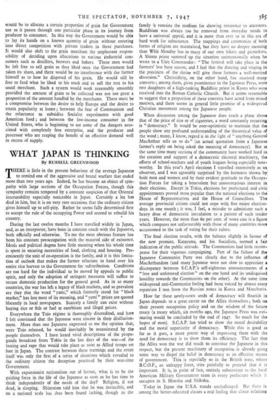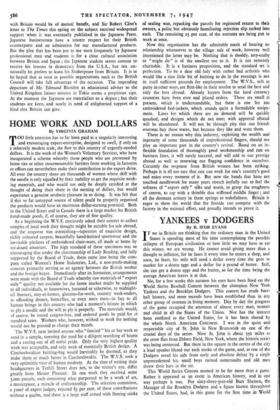WHAT JAPAN IS THINKING
By RUSSELL GREENWOOD
THERE is little in the present behaviour of the average Japanese to remind one of the aggressive and brutal warfare that ended more than two years ago. Indeed, he has become an object of sym- pathy with large sections of the Occupation Forces, though this sympathy remains tempered by a constant suspicion of that Oriental inscrutability especially noticeable in Japan. Certainly a lot has died in him, but it is on very rare occasions that the ordinary citizen gives himself up to self-pity. Rather he seems fully determined first to accept the rule of the occupying Power and second to rebuild his country.
During the last twelve months I have travelled widely in Japan, and, as an interpreter, have been in constant touch with the Japanese, both officially and otherwise. To me the most obvious feature has been his constant preoccupation with the material side of existence. Ideals and political dogma have little meaning when his whole time is spent in securing necessities of food, clothing, and housing. Pre- eminently the unit of co-operation is the family, and it is this limita- tion of outlook that makes the farmer reluctant to hand over his entire rice harvest to the Government for redistribution. Conditions are too hard for the individual to be moved by appeals to public spirit, and only the adoption of stringent measures will suffice to secure domestic production for the general good. As in so many countries, the war has left a legacy of black markets, and so prevalent are they that the word " yami," which formerly stood for " black market," has lost most of its meaning, and " yami " prices are quoted blatantly in local newspapers. Scarcely a family can exist without buying rice or fish or fuel at exorbitant and illegal prices.
Everywhere the Tojo regime is thoroughly discredited, and here I felt convinced that the Japanese were sincere in their disillusion- ment. More than one Japanese expressed to me the opinion that, were Tojo released, he would inevitably be assassinated by the people themselves. I have heard vivid descriptions of the propa- ganda broadcast from Tokio in the last days of the war—of the looting and rape that would take place as soon as Allied troops set foot in Japan. The contrast between these warnings and the event itself was only the first of a series of situations which revealed to the ordinary citizen 'the deception practised by their war-time Government.
With expansionist nationalism out of favour, what is to be the guiding force in the life of the Japanese as soon as he has time to think independently of the needs of the day? Religion, if not dead, is sleeping. Shintoism told hint that he was invincible, and on a national scale has thus been found lacking, though in the
family it remains the medium for showing reverence to ancestors. Buddhism was always too far removed from everyday needs to have a universal appeal, and it is more than ever so in this era of hard work for subsistence. The trappings and ceremonies of both forms of religion are maintained, but they have no deeper meaning than Whit Monday has to many of our own hikers and picnickers. A Shinto priest summed up the situation unintentionally when he wrote to a Unit Commander : " The festival will take place in the farmers' less busy season, and I feel that the dancing and singing in the precincts of the shrine will give these farmers a well-merited diversion." Christilnity, on the other hand, has received many converts ; among them, given prominence in the Japanese Press, were two daughters of a high-ranking Buddhist priest in Kyoto who were received into the Roman Catholic Church. But it seems reasonable to suggest that a proportion of these converts have acted from mixed motives, and there seems in general little promise of a widespread Christian movement among the Japanese people.
When discussion among the Japanese does reach a plane above that of the price of rice or of cigarettes, a word constantly recurring is "democracy." It would 'be over-optimistic to maintain that the people show any profound understanding of the theoretical value of the word ; many, I know, regard it in the light of " anything General MacArthur tells us to do " (an actual quotation from a Japanese farmer's reply on being asked the meaning of democracy). But at the same time many sections of the community have worked hard in the creation and support of a democratic electoral machinery, the efforts of school-teachers and of youth leagues being especially note- worthy. In this year's April elections I travelled extensively as an observer, and I was agreeably surprised by the keenness shown byl both men and women and by their evident gratitude to the Occupa-1 tion Forces for taking a benevolent but unostentatious interest in their elections. Except in Tokio, elections for prefectural and civie appointments proved more popular than the national elections to the House of Representatives and the House of Councillors. The average provincial citizen could not cope with five major election- days in one month ; it was, I feel, a mistake to administer such a heavy dose of democratic inoculation to a patient of such tender years. However, the more than 6o per cent. of votes cast is a figure which compares not unfavourably with those of many countries more accustomed to the task of voting for their rulers.
The final election results, with the balance slightly in favour of the new premier, Katayama, and his Socialists, seemed a fait indication of the public attitude. The Communists had little recom- pense for their vigorous campaigning. Part of the failure of the Japanese Communist Party was clearly due to the influence oi MacArthurdom (and many Japanese were not slow to appreciate a discrepancy between S.C.A.P.'s self-righteous announcements of a " free and unfettered election " on the one hand and its undisguised hostility towards the Communists on the other). At the same time widespread anti-Communist feeling had been voiced by almost every repatriate I met from the Russian zones in Korea and Manchuria.
How far these newly-sown seeds of democracy will flourish in Japan depends to a great extent on the Allies themselves ; both on their present occupation policy and on the wisdom of the future treaty (a treaty which, six months ago, the Japanese Press was esti- mating would be concluded by the end of 1947. So much for the hopes of men). S.C.A.P. has tried to show the moral desirability and the moral superiority of democracy. While this is good as far as it goes, a more potent way of impressing them with the need for democracy is to show them its efficiency. The fact that the Allies won the war did much to convince the Japanese in this respect, but the present machinery of occupation is already going some way to dispel the belief in democracy as an effective means of government. This is especially so in the British zone, where B.C.O.F., an unhappy force, tries painfully to pretend that it is important. It is, in point of fact, entirely subservient to the local American Military Government team in every prefecture which it occupies in S. Honshu and Shikoku.
Today in Japan the U.S.A. stands unchallenged. But there is .among the better-educated classes a real feeling that closer relational with Britain would be of mutual benefit, and Sir Robert Clive's letter to The Times this spring on the subject received widespread support when it was eventually published in the Japanese Press. Japanese businessmen have a sincere respect for their British counterparts and an admiration for our manufactured products. But the plea that has been put to me most frequently by Japanese professional men and students is for a close cultural association between Britain and Japan ; the Japanese student seems content to receive his lessons in democracy from the U.S.A., but not un- naturally he prefers to learn his Shakespeare from Britain. It is to be •hoped that as soon as possible organisations such as the British Council will take full advantage of the occasion. The impending departure of Mr. Edmund Blunden as educational adviser to the United Kingdom liaison mission in Tokio seems a propitious sign. At the moment the Japanese are materialists to a degree ; but their students are keen, and sorely in need of enlightened support of a kind that Britain can give.



































 Previous page
Previous page